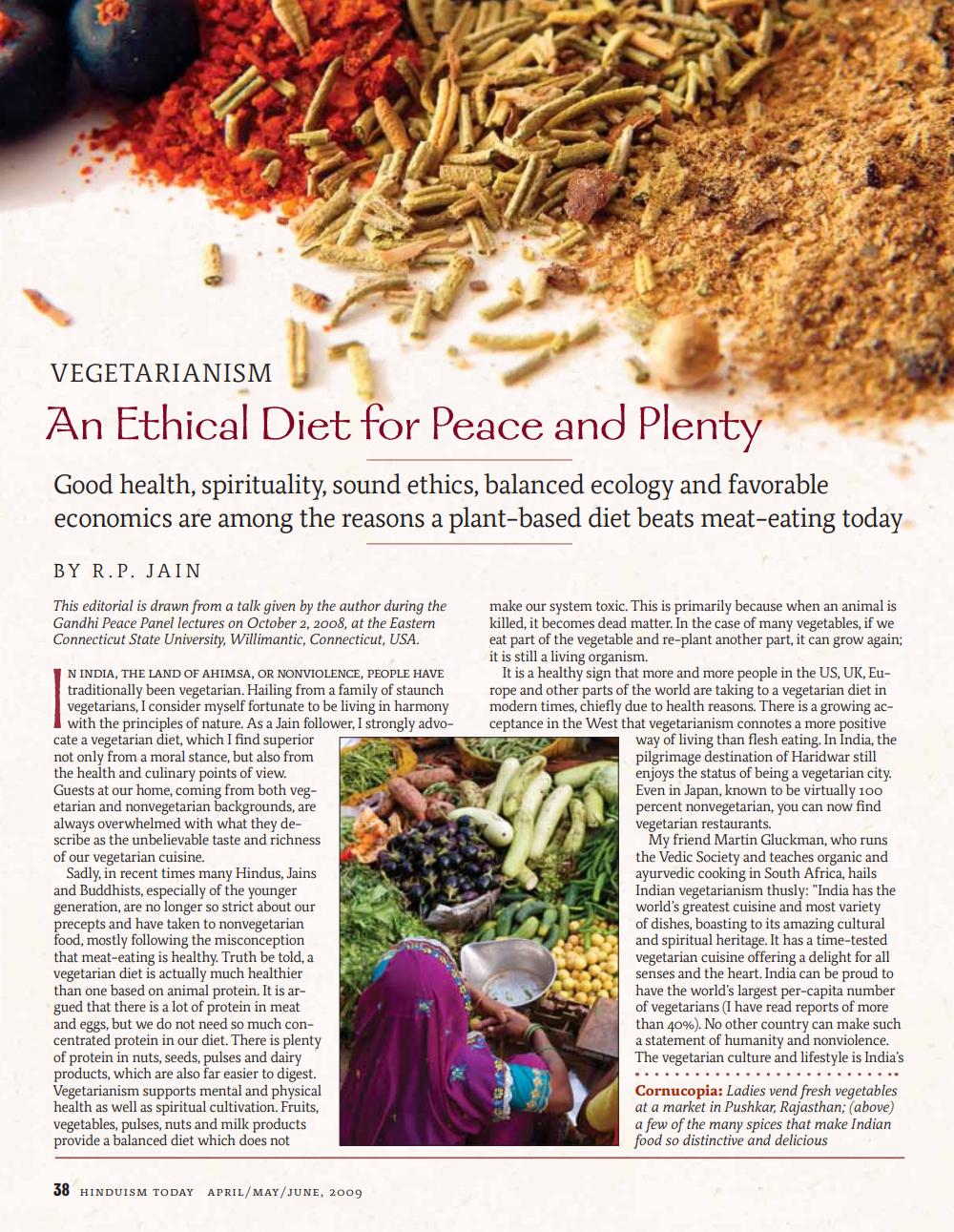Book Title: Vegetarianism An Ethical Diet for Peace and Plenty Author(s): Publisher: ZZZ Unknown View full book textPage 1
________________ VEGETARIANISM An Ethical Diet for Peace and plenty Good health, spirituality, sound ethics, balanced ecology and favorable economics are among the reasons a plant-based diet beats meat-eating today BY R.P. JAIN This editorial is drawn from a talk given by the author during the Gandhi Peace Panel lectures on October 2, 2008, at the Eastern Connecticut State University, Willimantic, Connecticut, USA. N INDIA, THE LAND OF AHIMSA, OR NONVIOLENCE, PEOPLE HAVE traditionally been vegetarian. Hailing from a family of staunch vegetarians, I consider myself fortunate to be living in harmony with the principles of nature. As a Jain follower, I strongly advocate a vegetarian diet, which I find superior not only from a moral stance, but also from the health and culinary points of view. Guests at our home, coming from both vegetarian and nonvegetarian backgrounds, are always overwhelmed with what they describe as the unbelievable taste and richness of our vegetarian cuisine. Sadly, in recent times many Hindus, Jains and Buddhists, especially of the younger generation, are no longer so strict about our precepts and have taken to nonvegetarian food, mostly following the misconception that meat-eating is healthy. Truth be told, a vegetarian diet is actually much healthier than one based on animal protein. It is argued that there is a lot of protein in meat and eggs, but we do not need so much concentrated protein in our diet. There is plenty of protein in nuts, seeds, pulses and dairy products, which are also far easier to digest. Vegetarianism supports mental and physical health as well as spiritual cultivation. Fruits, vegetables, pulses, nuts and milk products provide a balanced diet which does not make our system toxic. This is primarily because when an animal is killed, it becomes dead matter. In the case of many vegetables, if we eat part of the vegetable and re-plant another part, it can grow again; it is still a living organism. It is a healthy sign that more and more people in the US, UK, Europe and other parts of the world are taking to a vegetarian diet in modern times, chiefly due to health reasons. There is a growing acceptance in the West that vegetarianism connotes a more positive way of living than flesh eating. In India, the pilgrimage destination of Haridwar still enjoys the status of being a vegetarian city. Even in Japan, known to be virtually 100 percent nonvegetarian, you can now find vegetarian restaurants. My friend Martin Gluckman, who runs the Vedic Society and teaches organic and ayurvedic cooking in South Africa, hails Indian vegetarianism thusly: "India has the world's greatest cuisine and most variety of dishes, boasting to its amazing cultural and spiritual heritage. It has a time-tested vegetarian cuisine offering a delight for all senses and the heart. India can be proud to have the world's largest per-capita number of vegetarians (I have read reports of more than 40%). No other country can make such a statement of humanity and nonviolence. The vegetarian culture and lifestyle is India's ........................... Cornucopia: Ladies vend fresh vegetables at a market in Pushkar, Rajasthan; (above) a few of the many spices that make Indian food so distinctive and delicious 38 HINDUISM TODAY APRIL/MAY/JUNE, 2009Page Navigation
1 2
